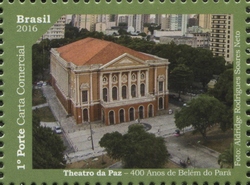Stamp: 400 Years of the Founding of the City of Belém of Pará (Brazil 2016)
400 Years of the Founding of the City of Belém of Pará (Brazil 2016)
12 January (Brazil ) within release 400 Years of the Founding of the City of Belém of Pará goes into circulation Stamp 400 Years of the Founding of the City of Belém of Pará face value 1st class domestic
| Stamp 400 Years of the Founding of the City of Belém of Pará in catalogues | |
|---|---|
| WADP Numbering System - WNS: | WAD:BR002.16 |
Stamp is horizontal format.
Also in the issue 400 Years of the Founding of the City of Belém of Pará:
- Stamp - 400 Years of the Founding of the City of Belém of Pará face value 1st class domestic;
- Stamp - 400 Years of the Founding of the City of Belém of Pará face value 1st class domestic;
- Stamp - 400 Years of the Founding of the City of Belém of Pará face value 1st class domestic;
- Stamp - 400 Years of the Founding of the City of Belém of Pará face value 1st class domestic;
- Stamp - 400 Years of the Founding of the City of Belém of Pará face value 1st class domestic;
- Stamp - 400 Years of the Founding of the City of Belém of Pará face value 1st class domestic;
- Stamp - 400 Years of the Founding of the City of Belém of Pará face value 1st class domestic;
- Stamp - 400 Years of the Founding of the City of Belém of Pará face value 1st class domestic;
- Mini Sheet - 400 Years of the Founding of the City of Belém of Pará face value ;
Stamp 400 Years of the Founding of the City of Belém of Pará it reflects the thematic directions:
Classical antiquity, also known as the classical era, classical period, classical age, or simply antiquity, is the period of cultural European history between the 8th century BC and the 5th century AD. It comprises the interwoven civilizations of ancient Greece and Rome, known together as the Greco-Roman world, which played a major role in shaping the culture of the Mediterranean Basin. It is the period during which ancient Greece and Rome flourished and had major influence throughout much of Europe, North Africa, and West Asia. Classical antiquity was succeeded by the period now known as late antiquity.
History (derived from Ancient Greek ἱστορία (historía) 'inquiry; knowledge acquired by investigation') is the systematic study and documentation of the human past
Architecture (Latin architectura, from the Greek ἀρχιτέκτων arkhitekton "architect", from ἀρχι- "chief" and τέκτων "builder") is both the process and the product of planning, designing, and constructing buildings and other physical structures. Architectural works, in the material form of buildings, are often perceived as cultural symbols and as works of art. Historical civilizations are often identified with their surviving architectural achievements.
The period of events before the invention of writing systems is considered prehistory. "History" is an umbrella term comprising past events as well as the memory, discovery, collection, organization, presentation, and interpretation of these events. Historians seek knowledge of the past using historical sources such as written documents, oral accounts, art and material artifacts, and ecological markers. History is incomplete and still has debatable mysteries.



